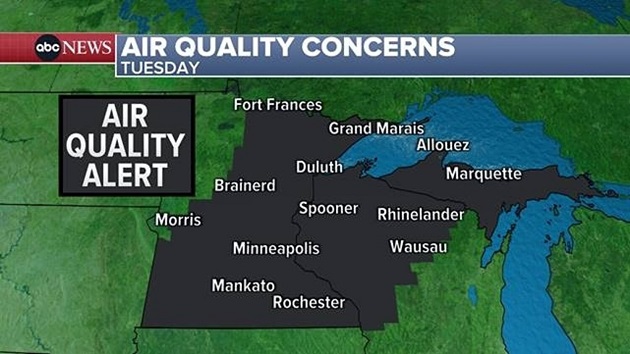
(NEW YORK) -- Smoke from raging wildfires in Canada continues to bring dangerous air quality conditions to parts of the northern United States, with hazy skies in the East.
As of Wednesday, there are 203 active wildfires burning in Canada, with 102 of these considered to be "out of control," meaning fires that are being observed and assessed, but not immediately suppressed, according to the Canadian Interagency Forest Fire Centre.
The smoke from the flames will create potentially dangerous air quality conditions in Minnesota, Wisconsin and the Upper Peninsula of Michigan on Wednesday.
For the second morning in a row, Minneapolis had some of the worst air quality conditions in the world on Wednesday. The entire state of Minnesota and Wisconsin will remain under air quality alerts until noon local time. Additionally, northern Michigan will be under air quality alerts until 3 a.m. Thursday.
The entire state of Iowa will also be under an air quality alert until 6 a.m. Thursday, with smoke even posing a threat to healthy individuals, according to the Iowa Department of Natural Resources.
Due to the dangerous air quality, those in impacted areas are encouraged to reduce long or intense activities, take more breaks while outside or reschedule outdoor activities, the department of natural resources said.
Throughout the day on Wednesday, the heavy smoke will be visible through the Upper Peninsula of Michigan, Wisconsin, northwest Missouri along with central and eastern Iowa. The majority of the smoke will fade away on Wednesday evening.
Haze over the East and the Northeast will continue to be noticeable on Wednesday, but is expected to weaken in the coming days. A "milky" sky is expected through the end of the week in these areas, especially in the Northeast.
As of Tuesday, the areas of Canada with the most fires include British Columbia with 67 and Alberta with 53, according to the CIFFC.
The combination of dry conditions and "little-to-no precipitation" will continue to feed the flames and make it difficult for officials to manage the fires, Saskatchewan Public Safety said on Sunday.
During a press conference on Monday, Saskatchewan Public Safety discouraged any nonessential travel due to the significant fire activity.
Aircraft and dozens of personnel from other Canadian provinces and the United States -- including Arizona, Oregon and Alaska -- are being sent to help fight the wildfires, according to the Saskatchewan Premier Scott Moe.
Moe said last week there has been a "significant lack of moisture" in the northern parts of the province, causing "over 200 wildfires" in Saskatchewan this spring.
Copyright © 2025, ABC Audio. All rights reserved.

